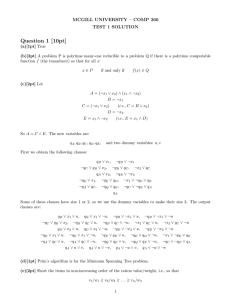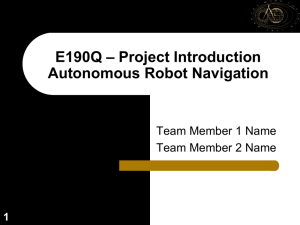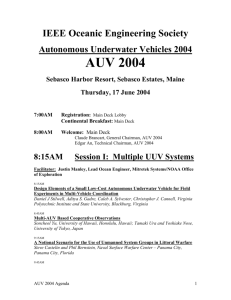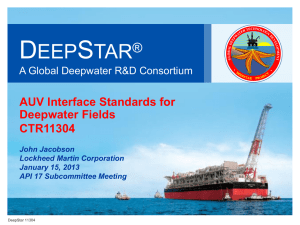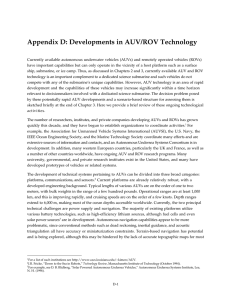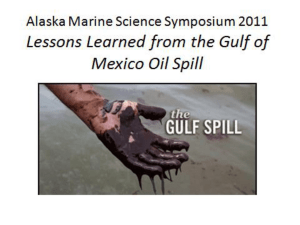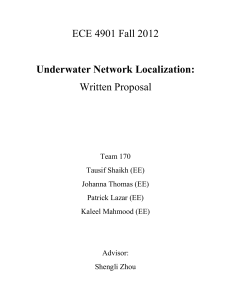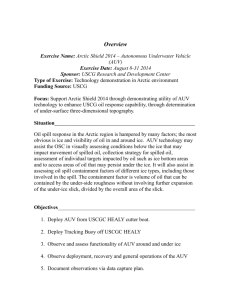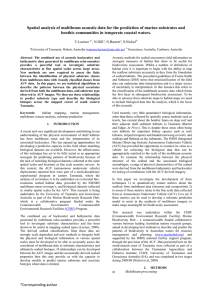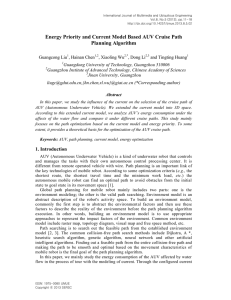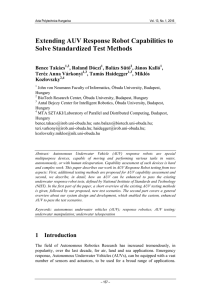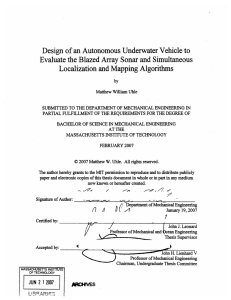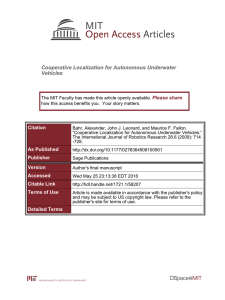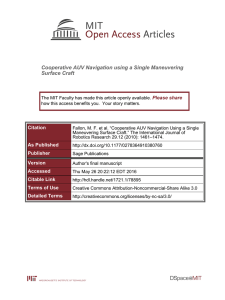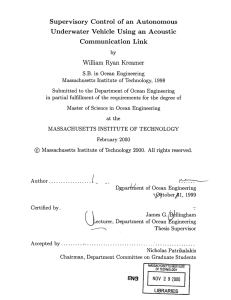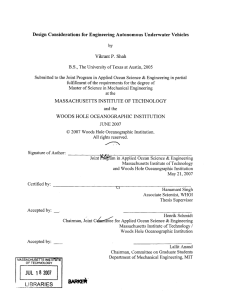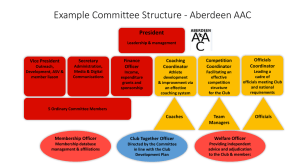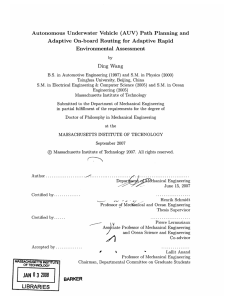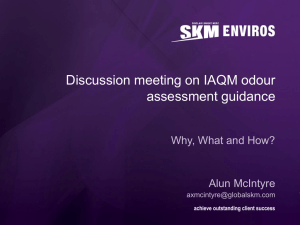Recent Advances in Underwater Robots at the Deep
advertisement
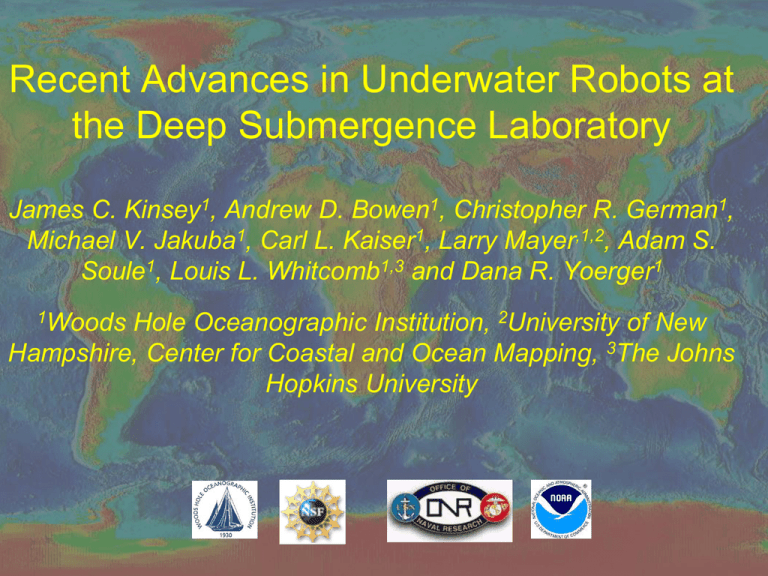
Recent Advances in Underwater Robots at the Deep Submergence Laboratory James C. Kinsey1, Andrew D. Bowen1, Christopher R. German1, Michael V. Jakuba1, Carl L. Kaiser1, Larry Mayer,1,2, Adam S. Soule1, Louis L. Whitcomb1,3 and Dana R. Yoerger1 1Woods Hole Oceanographic Institution, 2University of New Hampshire, Center for Coastal and Ocean Mapping, 3The Johns Hopkins University Deep Submergence Lab Design, build and operate a variety of ocean robots Home to the National Deep Submergence Facility (NDSF) Field Operations: 10+ ROV cruises/year ~10 AUV cruises/year Core areas include: Robotics Control and navigation Sensing Autonomy Deep Submergence Lab Design, build and operate a variety of ocean robots Home to the National Deep Submergence Facility (NDSF) Field Operations: 10+ ROV cruises/year ~10 AUV cruises/year Core areas include: Robotics Control and navigation Sensing Autonomy Today’s talk focuses on 2 recent projects: Coordinated AUV-ASV operations Nereid Under-Ice robot Coordinated AUV-ASV Operations AUV Operations: Then Credit: D. Yoerger WHOI Use to deploy a deep AUV and leave it for 20+ hours to go do other work LBL provided external nav aiding Very minimal telemetry Coordinated AUV-ASV Operations AUV Operations Now: Limited Acoustic Telemetry Transmitted science data enabled interrogation of mission progress Facilitated in-situ re-tasking of vehicle Acoustic telemetry has transformed AUV operations however it has created an “acoustic leash” for many AUVs! Strongest Plume Signal [German et al. PNAS 2010] [Camilli et al. Science 2010] Joint Vehicle Operations • • Image Credits: WHOI. • Joint operations with AUVs and ROVs or manned submersibles are increasingly common For example, in the last year the Sentry AUV did 6 cruises with either the Jason ROV or the Alvin manned submersible – With Alvin, Sentry dives at night for a 10-12 hour dive. Is recovered with a 50% battery charge. – With Jason, Sentry operates within ~5km of the ship. • Launch and recover with Jason in the water. Efficiency could be improved if Sentry could operate far away from the ship without having to sacrifice: – External navigation aiding – In-situ monitoring and intervention Autonomous AUV Tending • • • CONOPS – Actuated AUV and Waveglider – AUV/ASV deployed and recovered from ship – AUV performs mission as usual – ASV, with knowledge of AUV mission plan, “tends” AUV ASV as navigation aid – Eliminates ship-required USBL systems or pre-deployed transponders ASV as force-multiplier: – Provides operators with real-time data and re-tasking capability – Frees ship to perform other over-the-side operations Pilot Project Overview PROJECT GOALS • Demonstrate basic feasibility in shallow water – Wave-Glider ASV – Iver2 AUV • Develop software that coordinates ASV trajectory with the AUV Investigate performance of different WaveGlider ASV trajectories – Comms and Nav constraints Field tests • • . Acoustic Cycle (WHOI Micro-modems) OWTT GPS & Range Iver State Ping WG GPS & Range Ping Reply Iver State WG GPS & Range for single-range nav State Estimate & Science Data Coordinator software on Wave-Glider manages acoustic communications cycle and determines ASV trajectory. Navigation code uses DVL, compass, and range data to estimate AUV position. Oct 2012 Buzzards Bay Experiments - Results AUV mission planned a-priori; ASV has knowledge of the mission. ASV plans its trajectory based on the AUV trajectory and the current AUV position External aiding provided by single acoustic modem ranges Experiment demonstrated the following capabilities: Active control of the WG-ASV External navigation aiding using WG Using WG as a telemetry relay for data uplink and retasking Our long term vision for ASV-AUV deep ocean operations AUV Tending (10s of km) Ridge-Segment (100s of km) Basin-Scale (1000s of km) Nereid Under-Ice (NUI) • Nereid Under-Ice (NUI) focuses on exploring biological and physical environments in the polar regions including: • Operations under fixed ice shelves • Operations moving sea ice • Tasks include: • • • • Near-ice inspection and mapping Instrument emplacement Sediment sampling Grounding line inspection NUI Specifications NUI Concept of Operations: Light Fiber-Optic Tether Operations Light-weight Armored Cable (10 m - 100 m) Acoustics package nUI Depressor (~50 kg) Umbilical (5 m) Light Fiber-Optic Tether (20 km) Tow-body (~35 kg) Operating Envelope Two-body launch : • No descent/ascent weights---Pilot has control. • Short descent (10-20 m) • Light-weight depressor/tow-body system, ~85kg, 2 m tall NUI Summer 2014 Deployments at 83° N 6° W F/V Polarstern PS86 Launch and Recovery Under-Ice Questions jkinsey@whoi.edu
